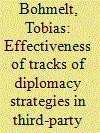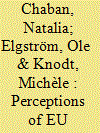| Srl | Item |
| 1 |
ID:
094695


|
|
|
|
|
| Publication |
2010.
|
| Summary/Abstract |
International mediation is not conducted solely by official actors such as states or international organizations. Non-official parties such as individuals and non-governmental organizations increasingly intervene as third-party mediators in conflicts. Both official and unofficial interventions are conceptualized as tracks of diplomacy (ToDs). Even though there is a vast quantitative literature on international mediation, most studies focusing on ToDs have been qualitative and produced few generalizable insights. This article extends the existing literature on third-party intervention by developing a theoretical model to explain the effectiveness of different ToDs, which is then empirically tested in a first large-N study. The findings indicate that the leverage and resources of ToDs determine outcome effectiveness. Track One Diplomacy, that is, efforts by official actors, tends to be the most effective form of intervention as greater leverage and more resources invested can make track intervention more effective. It is also found that combined mediation efforts of both official and unofficial tracks can be more effective than independent track actions. Since conflicts with mediation are unlikely to be a randomly selected set, a selection estimator is used to test the hypotheses on effectiveness. The empirical findings support the theory and demonstrate that the specific type of mediating actor seems highly important.
|
|
|
|
|
|
|
|
|
|
|
|
|
|
|
|
| 2 |
ID:
170753


|
|
|
|
|
| Summary/Abstract |
A small but growing literature has started to analyse the European Union (EU) ‘as an effective peacemaker’. We make a contribution to this field by investigating EU mediation effectiveness in the Russia–Ukraine conflict. The focus is on perceptions of effectiveness. Based on information from semi-structured interviews, we compare EU self-images with Ukrainian evaluations of EU mediation efforts. How effective is the EU, including its Member States, deemed to be? What factors are believed to lie behind perceived (in)effectiveness? We concentrate on four such factors, derived from the mediator literature: perceived (im)partiality, coherence and credibility and, finally, evaluations of the EU’s mediation strategies. Both internal and external views singled out EU member states as the most effective actors in current mediation. The role of EU was seen in ambivalent terms by both sides. All the four determinants of mediation effectiveness are discussed in our material, but differ considerably in the degree of attention given to each of them. While (im)partiality is not a factor that is linked to effectiveness in any straightforward way, EU incoherence is associated with inconsistent and weak policies, notably in the Ukraine material.
|
|
|
|
|
|
|
|
|
|
|
|
|
|
|
|